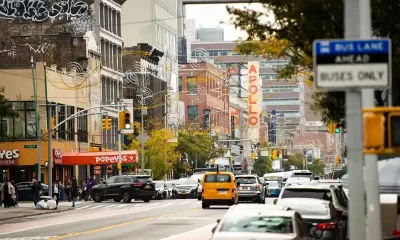Business
Florida Advocacy Group Files Brief Against Attorney General for Challenging 2024 Ballot Initiative

Smart & Safe Florida recently filed a Supreme Court brief addressing the claims of Attorney General Ashley Moody who seeks to prevent the initiative from being included on the ballot.
The Florida-based advocacy group Smart & Safe Florida (SSF) has been hard at work trying to get a cannabis legalization initiative on the ballot for 2024. The most recent developments include new briefs filed with the Florida Supreme Court.
On July 19, Smart & Safe Florida, alongside the Medical Marijuana Business Association of Florida and Cato Institute, filed a new brief with the Florida Supreme Court in response to Attorney General Ashley Moody who is challenging the initiative. The Supreme Court is labeling this as a “high profile case.”
In the brief, SSF states that the “roadmap” for previous cannabis ballot initiatives has been guiding cannabis reform, but that Moody is attempting to alter that process. “In the past several years, this Court has established a ‘roadmap’ for sponsors of marijuana-related ballot initiatives. In drafting the Initiative, SSF followed that clear roadmap. But the Attorney General and other opponents now argue that this court should abruptly redraw the map,” the brief stated. “The Attorney General’s lead argument is that this court should discard three of its recent precedents—precedents that it expressly encouraged ballot sponsors to use as blueprints for drafting future initiatives.”
In attempting to “redraw” this initiative map, SSF claims that Moody is suggesting that the Supreme Court “…abandon the deferential standard of review that it has consistently applied to ballot initiatives for decades, essentially arguing that this Court committed legal error in dozens of decisions, and that it should invent a new, more lenient standard for discarding precedent.”
SSF is asking the Supreme Court to “reject these misguided efforts to jettison established legal rules in service of a thinly veiled policy agenda,” and to confirm that SSF’s initiative “satisfies the legal requirements to be placed on the ballot.”
Medical Marijuana Business Association of Florida and Cato Institute also issued individual briefs as well.
The Medical Marijuana Business Association of Florida said that Moody’s argument is “misleading because it fails to disclose that there may be a significant period in which the marijuana industry will be unregulated in the production of marijuana for non-medical personal use by adults, ignores the current regulatory scheme that would remain in place, is speculative, and is belied by Florida’s history of robustly regulating marijuana.” The organization asserts that the ballot title and summary are not misleading, and should be approved.
The Cato Institute’s brief argues that the ballot initiative does not violate the state’s single subject rule for ballot initiatives.
In order for SSF’s ballot to fully qualify, it will need to submit 891,589 valid signatures. In March, SSF submitted 420,000 signatures toward the initiative’s goal to qualify for the ballot, but only 222,881 signatures were required to prompt a Florida Supreme Court review of the ballot summary text in order to move forward.
Two months later in May, Moody submitted her opinion that the ballot doesn’t meet the requirements of the single subject rule. “We very much look forward to [Moody’s] analysis but more importantly to both written and oral arguments before the Florida Supreme Court and a positive ruling from that court,” SSF said at the time. “As an aside, it is important to note that the opinion of the Attorney General is not binding and that this matter will be decided after both sides have had their say before the Florida Supreme Court.”
By June, Moody officially challenged the initiative with a legal opinion that the ballot title and summary is “incorrect and misleading” because cannabis is still illegal under federal law. Previously, Moody also called a ballot initiative from 2021 “misleading” and the Florida Supreme Court rejected the measure.
Cannabis company Trulieve has granted a total of $39.05 million toward getting a legalization initiative onto the ballot in 2024.
If the initiative is allowed to proceed to the ballot and is approved by voters, it would allow currently operating medical cannabis businesses to sell adult-use cannabis, but also allow state legislators to increase the number of dispensaries. For residents, it would allow adults to possess up to three ounces of flower and up to five grams of concentrates, but in its current form does not allow home cultivation and does not mention anything in regards to cannabis conviction expungement or social equity licensing.
Business
New Mexico cannabis operator fined, loses license for alleged BioTrack fraud

New Mexico regulators fined a cannabis operator nearly $300,000 and revoked its license after the company allegedly created fake reports in the state’s traceability software.
The New Mexico Cannabis Control Division (CCD) accused marijuana manufacturer and retailer Golden Roots of 11 violations, according to Albuquerque Business First.
Golden Roots operates the The Cannabis Revolution Dispensary.
The majority of the violations are related to the Albuquerque company’s improper use of BioTrack, which has been New Mexico’s track-and-trace vendor since 2015.
The CCD alleges Golden Roots reported marijuana production only two months after it had received its vertically integrated license, according to Albuquerque Business First.
Because cannabis takes longer than two months to be cultivated, the CCD was suspicious of the report.
After inspecting the company’s premises, the CCD alleged Golden Roots reported cultivation, transportation and sales in BioTrack but wasn’t able to provide officers who inspected the site evidence that the operator was cultivating cannabis.
In April, the CCD revoked Golden Roots’ license and issued a $10,000 fine, according to the news outlet.
The company requested a hearing, which the regulator scheduled for Sept. 1.
At the hearing, the CCD testified that the company’s dried-cannabis weights in BioTrack were suspicious because they didn’t seem to accurately reflect how much weight marijuana loses as it dries.
Company employees also poorly accounted for why they were making adjustments in the system of up to 24 pounds of cannabis, making comments such as “bad” or “mistake” in the software, Albuquerque Business First reported.
Golden Roots was fined $298,972.05 – the amount regulators allege the company made selling products that weren’t properly accounted for in BioTrack.
The CCD has been cracking down on cannabis operators accused of selling products procured from out-of-state or not grown legally:
- Regulators alleged in August that Albuquerque dispensary Sawmill Sweet Leaf sold out-of-state products and didn’t have a license for extraction.
- Paradise Exotics Distro lost its license in July after regulators alleged the company sold products made in California.
Golden Roots was the first alleged rulebreaker in New Mexico to be asked to pay a large fine.
Source: https://mjbizdaily.com/new-mexico-cannabis-operator-fined-loses-license-for-alleged-biotrack-fraud/
Business
Marijuana companies suing US attorney general in federal prohibition challenge

Four marijuana companies, including a multistate operator, have filed a lawsuit against U.S. Attorney General Merrick Garland in which they allege the federal MJ prohibition under the Controlled Substances Act is no longer constitutional.
According to the complaint, filed Thursday in U.S. District Court in Massachusetts, retailer Canna Provisions, Treevit delivery service CEO Gyasi Sellers, cultivator Wiseacre Farm and MSO Verano Holdings Corp. are all harmed by “the federal government’s unconstitutional ban on cultivating, manufacturing, distributing, or possessing intrastate marijuana.”
Verano is headquartered in Chicago but has operations in Massachusetts; the other three operators are based in Massachusetts.
The lawsuit seeks a ruling that the “Controlled Substances Act is unconstitutional as applied to the intrastate cultivation, manufacture, possession, and distribution of marijuana pursuant to state law.”
The companies want the case to go before the U.S. Supreme Court.
They hired prominent law firm Boies Schiller Flexner to represent them.
The New York-based firm’s principal is David Boies, whose former clients include Microsoft, former presidential candidate Al Gore and Elizabeth Holmes’ disgraced startup Theranos.
Similar challenges to the federal Controlled Substances Act (CSA) have failed.
One such challenge led to a landmark Supreme Court decision in 2005.
In Gonzalez vs. Raich, the highest court in the United States ruled in a 6-3 decision that the commerce clause of the U.S. Constitution gave Congress the power to outlaw marijuana federally, even though state laws allow the cultivation and sale of cannabis.
In the 18 years since that ruling, 23 states and the District of Columbia have legalized adult-use marijuana and the federal government has allowed a multibillion-dollar cannabis industry to thrive.
Since both Congress and the U.S. Department of Justice, currently headed by Garland, have declined to intervene in state-licensed marijuana markets, the key facts that led to the Supreme Court’s 2005 ruling “no longer apply,” Boies said in a statement Thursday.
“The Supreme Court has since made clear that the federal government lacks the authority to regulate purely intrastate commerce,” Boies said.
“Moreover, the facts on which those precedents are based are no longer true.”
Verano President Darren Weiss said in a statement the company is “prepared to bring this case all the way to the Supreme Court in order to align federal law with how Congress has acted for years.”
While the Biden administration’s push to reschedule marijuana would help solve marijuana operators’ federal tax woes, neither rescheduling nor modest Congressional reforms such as the SAFER Banking Act “solve the fundamental issue,” Weiss added.
“The application of the CSA to lawful state-run cannabis business is an unconstitutional overreach on state sovereignty that has led to decades of harm, failed businesses, lost jobs, and unsafe working conditions.”
Business
Alabama to make another attempt Dec. 1 to award medical cannabis licenses

Alabama regulators are targeting Dec. 1 to award the first batch of medical cannabis business licenses after the agency’s first two attempts were scrapped because of scoring errors and litigation.
The first licenses will be awarded to individual cultivators, delivery providers, processors, dispensaries and state testing labs, according to the Alabama Medical Cannabis Commission (AMCC).
Then, on Dec. 12, the AMCC will award licenses for vertically integrated operations, a designation set primarily for multistate operators.
Licenses are expected to be handed out 28 days after they have been awarded, so MMJ production could begin in early January, according to the Alabama Daily News.
That means MMJ products could be available for patients around early March, an AMCC spokesperson told the media outlet.
Regulators initially awarded 21 business licenses in June, only to void them after applicants alleged inconsistencies with how the applications were scored.
Then, in August, the state awarded 24 different licenses – 19 went to June recipients – only to reverse themselves again and scratch those licenses after spurned applicants filed lawsuits.
A state judge dismissed a lawsuit filed by Chicago-based MSO Verano Holdings Corp., but another lawsuit is pending.
Source: https://mjbizdaily.com/alabama-plans-to-award-medical-cannabis-licenses-dec-1/
-

 Business2 years ago
Business2 years agoPot Odor Does Not Justify Probable Cause for Vehicle Searches, Minnesota Court Affirms
-

 Business2 years ago
Business2 years agoNew Mexico cannabis operator fined, loses license for alleged BioTrack fraud
-

 Business2 years ago
Business2 years agoAlabama to make another attempt Dec. 1 to award medical cannabis licenses
-

 Business2 years ago
Business2 years agoWashington State Pays Out $9.4 Million in Refunds Relating to Drug Convictions
-

 Business2 years ago
Business2 years agoMarijuana companies suing US attorney general in federal prohibition challenge
-

 Business2 years ago
Business2 years agoLegal Marijuana Handed A Nothing Burger From NY State
-

 Business2 years ago
Business2 years agoCan Cannabis Help Seasonal Depression
-

 Blogs2 years ago
Blogs2 years agoCannabis Art Is Flourishing On Etsy













